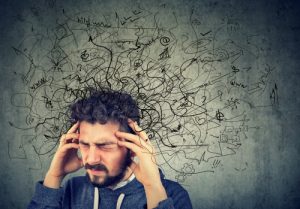Managing anxiety caused by chronic pain
August 12, 2019

This can be a stressful situation, and it often causes anxiety. Researchers have found that experiencing a chronic illness puts a person at increased risk for developing anxiety or an anxiety disorder.
Tips for managing anxiety caused by chronic pain
Even after coming to terms with your diagnosis, the daily demands of living with a chronic illness can continue to present challenges that cause anxiety. Loss of mobility and/or experiencing debilitating pain regularly can lead to worry about safety, employment, and finances. Many people feel overwhelmed with anxiety and struggle to handle it, so if this is something you are experiencing, you are not alone.
The good news is that there are many ways to treat anxiety. Therapy, medication, and complementary and alternative treatments are good places to start. Since this is happening in conjunction with a chronic condition, it’s important not to overlook the mental health side of things. When meeting with your physician at Southside Pain Specialists, please bring this up to us.
Treatment options for anxiety caused by chronic pain
- Medications. This is where many people start. A variety of antidepressants may be prescribed, and some of these may also help alleviate pain. Research most strongly supports the use of serotonin and norepinephrine reuptake inhibitors (SNRIs) or tricyclic antidepressants (TCAs) as drugs that can treat both psychiatric disorders and pain. Mood stabilizers may also be prescribed for some patients.
- Cognitive-behavioral therapy (CBT). This approach may treat anxiety disorders as well as chronic pain conditions. CBT is based on the idea that thoughts, feelings, and sensations are all related. Therapists use CBT to help patients learn coping skills so that they can manage their pain.
- Relaxation techniques. Which exact option is best for you will depend on your specific chronic condition, but relaxation can help people develop the ability to cope more effectively with anxiety and pain. Common techniques include breathing retraining, mindfulness meditation, progressive muscle relaxation, and exercise.
- Complementary and alternative treatment. Yoga, acupuncture, and massage are options that may relieve the symptoms of anxiety disorders as well as chronic pain.
- Exercise. This one deserves mentioning all on its own. Regular exercise strengthens muscles, reduces stiffness, improves flexibility, and boosts mood and self-esteem. Always check with your doctor before beginning an exercise program.
- Sleep. A good night’s sleep is key for anxiety disorders and chronic pain conditions. Symptoms of both types of conditions often become worse without enough sleep.
- Nutrition. People with anxiety should limit or avoid caffeine and alcohol since both can trigger panic attacks and worsen anxiety symptoms. Some types of food may aggravate some musculoskeletal conditions, including dairy products, gluten, corn, sugar, and members of the nightshade family.
We want to be sure that you know the signs of anxiety in conjunction with chronic illness since many times people do not recognize exactly what is going on. They may even think some of these symptoms are just a natural part of their chronic pain condition, but there are many things we can do about it.
Signs of anxiety:
- Excessively worrying about physical health
- Trouble sleeping due to worry
- Having nightmares about physical health
- Having panic attacks related to your prognosis
- Difficulty discussing your physical condition
- Avoiding treatments that cause anxiety
- Avoiding social interactions
- Having intrusive thoughts about dying
- Becoming irritable about physical health
Please let your doctor know if you are experiencing any of the above symptoms so that we can help get you on the path to treatment and back to your regular life as much as possible.
Southside Pain Specialists is your one-stop shop for pain management
With a multitude of pain relief options tailored to your specific needs, Southside Pain Specialists follow the standards of the American Society of Interventional Pain Physicians, The American Board of Pain Medicine and the International Spinal Injection Society and works hard to provide patients comprehensive, caring pain relief when they need it most. Check out our website or contact us today at 205.332.3155 to learn more.
